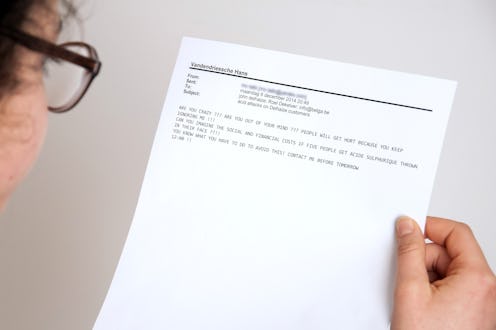Life
Does Sarcasm In Email Work?
It is the enduring curse of text-based communication: sarcasm just doesn't translate. In fact, anew research makes a pretty good case for never using sarcasm in emails — because even our friends can't tell when we're doing it. Knowing you might help a little, but apparently it still only goes so far... and miscommunications are the worst.
In a new study, researchers devised a two-part experiment in which participants wrote an email responding to a hypothetical situation that was mundane, but also somewhat emotional — think things like doing poorly on a test or watching your sports team win a game. In the first part of the experiment, the participants read over what they wrote and filled out a questionnaire about how they thought it would be received; then each email was read and rated by another participant who didn't know the person who wrote it. Then researchers compared the two evaluations. In the second part, however, participants were paired with one of their real friends, and after the participant rated their own email, the email was read and evaluated by their friend.
The Researchers found that even though people had more confidence that their friends would understand them than they did that strangers would understand, in reality, friends and strangers weren't any better at determining the emotional tone of the email.
Basically, your friends need social cues like tone of voice, body language, facial expression, and other context clues, to properly interpret the emotional tenor of your words, just like everyone else. Which also means pretty much no one can tell when you're being sarcastic in an email.
Of course, the results of the study have implications far beyond just sarcasm (though seriously, if you're going to be sarcastic in an email, explicitly tell people that's what's happening). Different messages can seem very different depending on what emotions you read into them.
For example, a message from your boss that says, "Please fix this," seems very different if you imagine their tone as polite versus annoyed. A message from your friend that says, "I can't even deal with you right now," seems very different if you picture them as either amused or angry. And don't even get me started on the range or possibilities in the message, "We need to talk." Sarcasm might have the biggest potential for misunderstandings — given that sarcasm is literally defined by a disconnect between words and meanings — but really all text-based communication is pretty fraught.
And the fact that we can't even rely on the people closest to us to properly interpret what we mean in writing has big implications. The researchers in this study found that the more confident a participant was that their friend would clearly understand the emotional tone of their email, the more off the friend's assessment tended to be. While this probably isn't a sign that people have no idea how well their friends know them, it might be a sign that people don't take as many precautions to avoid misunderstandings when it comes to those closest to us.
But since those people need just as many context clues to figure out our tone, it's worth trying to be just as clear when talking to your friends as you are with total strangers. Or, as researchers somewhat depressingly explain in the study, "Findings suggest that reliance upon friendship and context, as well as verbal and nonverbal cues, to interpret emotion in e-mail is ineffective, sometimes detrimental."
So how do you avoid this? Personally, I recommend making liberal use of GIFs and emoji. Everything is better with GIFs and emoji anyway.
Image: Giphy
